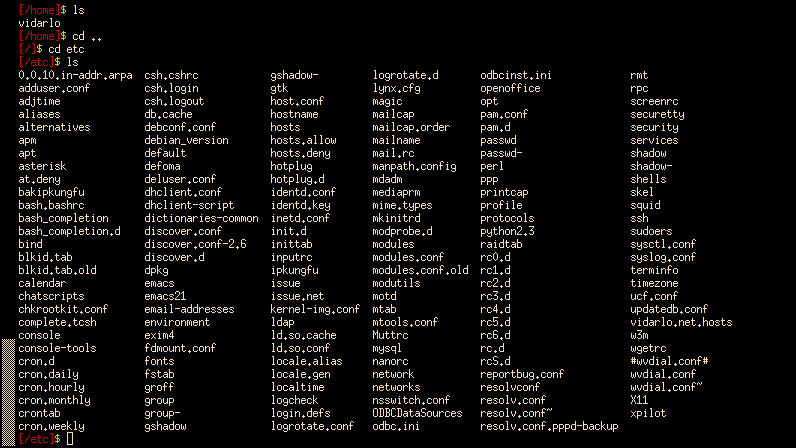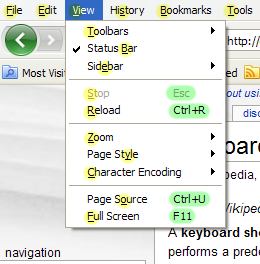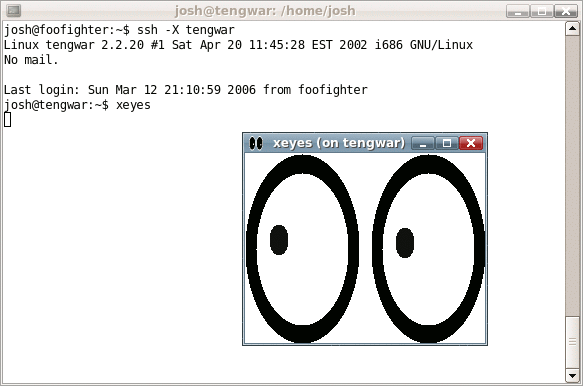|
Cwm (window Manager)
cwm (Calm Window Manager) is a stacking window manager for the X Window System. While it is primarily developed as a part of OpenBSD's base system, portable versions are available on other Unix-like operating systems. History Development of cwm started from patches to evilwm by Marius Aamodt Eriksen. To ease the implementation of new features, cwm was eventually rewritten using some code from 9wm. The last release by the original author came out in August 2005. In April 2007, cwm was imported into OpenBSD source tree. By January 2008, a substantial part of the original source code, including all of the 9wm code, was rewritten. cwm has been distributed with OpenBSD since version 4.2, where it replaced wm2. A third-party Linux port also exists. Description cwm is a stacking window manager oriented towards heavy keyboard usage, small footprint and ease of use. While it lacks explicit virtual desktops In computing, a virtual desktop is a term used with respect to u ... [...More Info...] [...Related Items...] OR: [Wikipedia] [Google] [Baidu] |
OpenBSD
OpenBSD is a security-focused operating system, security-focused, free and open-source, Unix-like operating system based on the Berkeley Software Distribution (BSD). Theo de Raadt created OpenBSD in 1995 by fork (software development), forking NetBSD 1.0. According to the website, the OpenBSD project emphasizes "portability, standardization, correctness, proactive security and integrated cryptography." The OpenBSD project maintains software portability, portable versions of many subsystems as package manager, packages for other operating systems. Because of the project's preferred BSD license, many components are reused in proprietary and corporate-sponsored software projects. The firewall (computing), firewall code in Apple Inc., Apple's macOS is based on OpenBSD's PF (firewall), PF firewall code, Android (operating system), Android's Bionic (software), Bionic C standard library is based on OpenBSD code, LLVM uses OpenBSD's regular expression library, and Windows 10 uses OpenSSH ... [...More Info...] [...Related Items...] OR: [Wikipedia] [Google] [Baidu] |
Terminal Emulator
A terminal emulator, or terminal application, is a computer program that emulates a video terminal within some other display architecture. Though typically synonymous with a shell or text terminal, the term ''terminal'' covers all remote terminals, including graphical interfaces. A terminal emulator inside a graphical user interface is often called a terminal window. A terminal window allows the user access to a text terminal and all its applications such as command-line interfaces (CLI) and text user interface (TUI) applications. These may be running either on the same machine or on a different one via telnet, ssh, dial-up, or over a direct serial connection. On Unix-like operating systems, it is common to have one or more terminal windows connected to the local machine. Terminals usually support a set of escape sequences for controlling color, cursor position, etc. Examples include the family of terminal control sequence standards known as ECMA-48, ANSI X3.64 or IS ... [...More Info...] [...Related Items...] OR: [Wikipedia] [Google] [Baidu] |
Free Software Programmed In C
Free may refer to: Concept * Freedom, having the ability to do something, without having to obey anyone/anything * Freethought, a position that beliefs should be formed only on the basis of logic, reason, and empiricism * Emancipate, to procure political rights, as for a disenfranchised group * Free will, control exercised by rational agents over their actions and decisions * Free of charge, also known as gratis. See Gratis vs libre. Computing * Free (programming), a function that releases dynamically allocated memory for reuse * Free format, a file format which can be used without restrictions * Free software, software usable and distributable with few restrictions and no payment * Freeware, a broader class of software available at no cost Mathematics * Free object ** Free abelian group ** Free algebra ** Free group ** Free module ** Free semigroup * Free variable People * Free (surname) * Free (rapper) (born 1968), or Free Marie, American rapper and media pers ... [...More Info...] [...Related Items...] OR: [Wikipedia] [Google] [Baidu] |
OpenBSD Journal
The OpenBSD Journal is an online newspaper dedicated to coverage of OpenBSD software and related events. The OpenBSD Journal is widely recognized as a reliable source of OpenBSD-related information. It is a primary reporter for such events as Hackathons. The site also hosts the OpenBSD developers' blogs. History The OpenBSD Journal was founded in 2000 and operated until 1 April 2004 at , On 1 April 2004 the editors James Phillips and Jose Nazario announced that the site ceased its operation. Daniel Hartmeier backed up the contents of the journal in order to preserve them. Further investigation to the articles' structure lead to creation of CGI-based engine that would enable access to the deadly.org's content on a backup server. Consequently, the functionality of adding new articles was implemented and the previous editors allowed to re-publish articles. The OpenBSD Journal was therefore reintroduced at on 9 April 2004. References Journal A journal, from the Old Frenc ... [...More Info...] [...Related Items...] OR: [Wikipedia] [Google] [Baidu] |
GitHub
GitHub, Inc. () is an Internet hosting service for software development and version control using Git. It provides the distributed version control of Git plus access control, bug tracking, software feature requests, task management, continuous integration, and wikis for every project. Headquartered in California, it has been a subsidiary of Microsoft since 2018. It is commonly used to host open source software development projects. As of June 2022, GitHub reported having over 83 million developers and more than 200 million repositories, including at least 28 million public repositories. It is the largest source code host . History GitHub.com Development of the GitHub.com platform began on October 19, 2007. The site was launched in April 2008 by Tom Preston-Werner, Chris Wanstrath, P. J. Hyett and Scott Chacon after it had been made available for a few months prior as a beta release. GitHub has an annual keynote called GitHub Universe. Org ... [...More Info...] [...Related Items...] OR: [Wikipedia] [Google] [Baidu] |
Concurrent Versions System
Concurrent Versions System (CVS, also known as the Concurrent Versioning System) is a revision control system originally developed by Dick Grune in July 1986. CVS operates as a front end to RCS, an earlier system which operates on single files. It expands upon RCS by adding support for repository-level change tracking, and a client-server model. Released under the terms of the GNU General Public License, CVS is free software. Design CVS operates as a front end to Revision Control System (RCS), an older version control system that manages individual files but not whole projects. It expands upon RCS by adding support for repository-level change tracking, and a client-server model. Files are tracked using the same history format as in RCS, with a hidden directory containing a corresponding history file for each file in the repository. CVS uses delta compression for efficient storage of different versions of the same file. This works well with large text files with few cha ... [...More Info...] [...Related Items...] OR: [Wikipedia] [Google] [Baidu] |
OSNews
OSNews is a computing online newspaper. It originally focused on operating systems and their related technologies that launched in 1997, but is now aggregating consumer electronics news. The content is managed by a group of editors and the owner. As of 2014, its managing editor is Thom Holwerda, who joined in 2005. OSnews has been referenced by ''TIME'', Ars Technica, ''Wired'', ''Computerworld'', LifeHacker, Linux.com, OMG! Ubuntu! and lwn.net. ''Wired'' described OSnews as "an alternative operating system Web magazine", and in 2011 Holwerda noted that "while the alternative operating systems scene might no longer be the prime focus of OSNews due to a lack of activity in that field, it's still where our heart lies." Staff *Thom Holwerda, who recently (as of 2021) moved from the Netherlands to Sweden, is managing editor. *David Adams is a publisher and regular contributor. *Eugenia Loli-Queru, the former editor-in-chief of OSNews, resigned in June 2005. Version 2 of OSNe ... [...More Info...] [...Related Items...] OR: [Wikipedia] [Google] [Baidu] |
Comparison Of X Window Managers
This article compares variety of different X window managers. For an introduction to the topic, see X Window System. General information Features See also * Comparison of X Window System desktop environments * Window manager * List of Wayland compositors This is a list of display servers. X11 *Cygwin/X *KDrive *Low Bandwidth X * MacX * Mir (display server) *MKS X/Server *Multi-Pointer X * Reflection X * RISCwindows * WiredX *X Window System * X-Win32 *X.Org Server *X386 * Xapollo *XDarwin *X ... References External links Comparison of extensible window managerscompares window managers "extensible" by user scripts, like Sawfish, xmonad, etc. ''The Comprehensive List of Window Managers for Unix'' {{X desktop environments and window managers Window managers X window managers ... [...More Info...] [...Related Items...] OR: [Wikipedia] [Google] [Baidu] |
Minimalism (computing)
In computing, minimalism refers to the application of minimalist philosophies and principles in the design and use of hardware and software. Minimalism, in this sense, means designing systems that use the least hardware and software resources possible. History In the late 1970s and early 1980s, programmers worked within the confines of relatively expensive and limited resources of common platforms. Eight or sixteen kilobytes of RAM was common; 64 kilobytes was considered a vast amount and was the entire address space accessible to the 8-bit CPUs predominant during the earliest generations of personal computers. The most common storage medium was the 5.25 inch floppy disk holding from 88 to 170 kilobytes. Hard drives with capacities from five to ten megabytes cost thousands of dollars. Over time, personal-computer memory capacities expanded by orders of magnitude and mainstream programmers took advantage of the added storage to increase their software's capabilities a ... [...More Info...] [...Related Items...] OR: [Wikipedia] [Google] [Baidu] |
Key Binding
computing, a keyboard shortcut also known as hotkey is a series of one or several keys to quickly invoke a software program or perform a preprogrammed action. This action may be part of the standard functionality of the operating system or application program, or it may have been written by the user in a scripting language. Some integrated keyboards also include pointing devices; the definition of exactly what counts as a "key" sometimes differs. The meaning of term "keyboard shortcut" can vary depending on software manufacturer. In Windows, hotkeys consists of a specific key combination used to trigger an action (these are usually system-wide shortcuts that are available in all contexts so long as receiving program is active); mnemonics represent a designated letter in a menu command or toolbar button that when pressed together with the Alt key, activates such command. The term is generally associated with computer keyboards, but many electronic musical instruments now ... [...More Info...] [...Related Items...] OR: [Wikipedia] [Google] [Baidu] |
Secure Shell
The Secure Shell Protocol (SSH) is a cryptographic network protocol for operating network services securely over an unsecured network. Its most notable applications are remote login and command-line execution. SSH applications are based on a client–server architecture, connecting an SSH client instance with an SSH server. SSH operates as a layered protocol suite comprising three principal hierarchical components: the ''transport layer'' provides server authentication, confidentiality, and integrity; the ''user authentication protocol'' validates the user to the server; and the ''connection protocol'' multiplexes the encrypted tunnel into multiple logical communication channels. SSH was designed on Unix-like operating systems, as a replacement for Telnet and for unsecured remote Unix shell protocols, such as the Berkeley Remote Shell (rsh) and the related rlogin and rexec protocols, which all use insecure, plaintext transmission of authentication tokens. SSH w ... [...More Info...] [...Related Items...] OR: [Wikipedia] [Google] [Baidu] |
C (programming Language)
C (''pronounced like the letter c'') is a General-purpose language, general-purpose computer programming language. It was created in the 1970s by Dennis Ritchie, and remains very widely used and influential. By design, C's features cleanly reflect the capabilities of the targeted CPUs. It has found lasting use in operating systems, device drivers, protocol stacks, though decreasingly for application software. C is commonly used on computer architectures that range from the largest supercomputers to the smallest microcontrollers and embedded systems. A successor to the programming language B (programming language), B, C was originally developed at Bell Labs by Ritchie between 1972 and 1973 to construct utilities running on Unix. It was applied to re-implementing the kernel of the Unix operating system. During the 1980s, C gradually gained popularity. It has become one of the measuring programming language popularity, most widely used programming languages, with C compilers avail ... [...More Info...] [...Related Items...] OR: [Wikipedia] [Google] [Baidu] |




